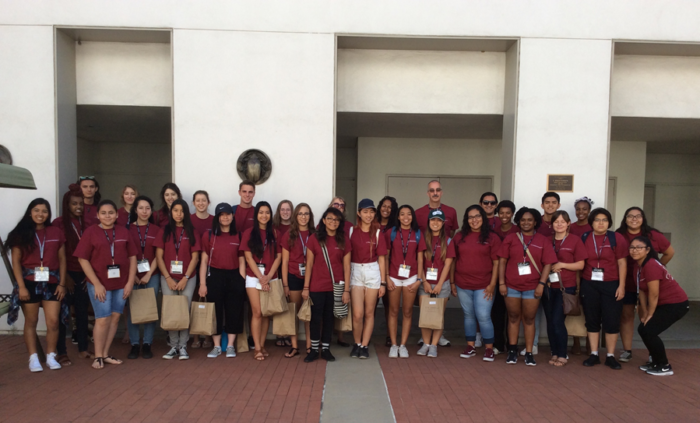Keck Science’s Summer Science Immersion Program (SScIP) returns for its fifth year this summer. Incoming first-year Scripps, CMC, and Pitzer students interested in science, technology, engineering, and mathematics (STEM) fields can take advantage of the weeklong program held in August. The summer experience is intended for first-generation college students, from groups traditionally underrepresented in science, and/or from under-resourced high schools. Students complete on-campus labs and lectures at Keck Sciences, fieldwork, lectures at California State University, Los Angeles (CSULA), and visit L.A. sights like the Griffith Observatory throughout the week. David Hensen, former dean of science at Keck, developed the initial framework for the program. Last year, 22 students participated in SScIP, allowing them to enjoy one-on-one time with faculty and staff from both the Keck Science Department and CSULA.
Marion Preest, interim dean and the Pritzker Family Foundation Professor of Biology, affirms the need for the program. “We want the students to realize what the Keck faculty already know: they can succeed in science or in any other career path,” Preest says. The program setup allows students to get used to the expectations of college science courses, while also allowing time to meet other incoming first-years and adjust to campus life.
Former SScIP students serve as peer mentors, helping new students with their transition to campus life and the demand of their science coursework. Data collected from the first three programs supports the program’s success; 94% of SScIP students completed their first-year STEM courses. The students acknowledge the value of the program in their transition to campus life and academics.
Preest reflects on her time coordinating the program. “I think the most beneficial aspects are the friendships the students develop and the support networks they form. Repeatedly, I hear from alums that their best friends are those they met during SScIP.” Students also credit the program, noting they would unlikely persist in science had they not experienced SScIP.
In previous years, the Howard Hughes Medical Institute provided complete funding for the program, covering lab supplies, field trips, and program fees. Keck Science received a fifth year, no cost, extension with HHMI to cover through the end of the 2017 program. With the grant ending, Scripps College looked to secure funding for continuation of the SScIP experience. Thankfully, the Beckman Coulter Foundation contributed $10,000, and Southern California Edison provided $15,000 to ensure the program continues.
Marci Raudez, who serves in Foundation and Community Relations at the Beckman Coulter Foundation says, “Part of our foundation’s vision is to advance scientific education. We are delighted to be able to provide our support to this program and to its students who see their future in STEM.”
While grant funding is secure this year, SScIP is looking to individuals, organizations, and foundations for continued support. If you are interested in learning more about the program and how to give to the sciences, please contact the Office of Foundation, Corporate & Government Relations, at [email protected] or (909) 607-1544. You can also visit scrippscollege.edu/giving to make a gift directly.

Photo caption: The 2016 class prepares for a trip to the Griffith Observatory.
Sophie Fahey ’17 is a contributing writer for this article.

